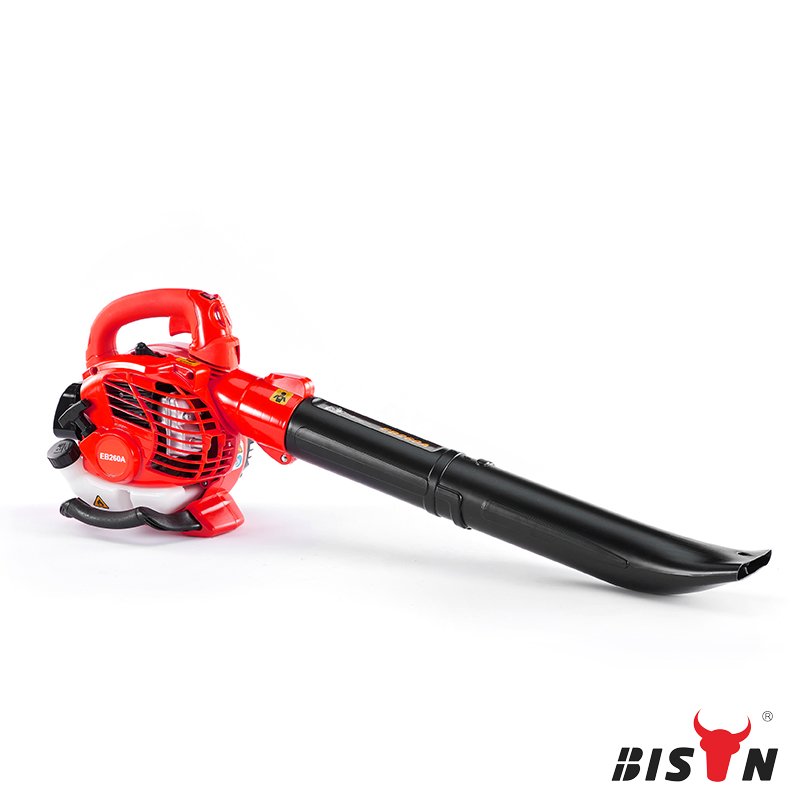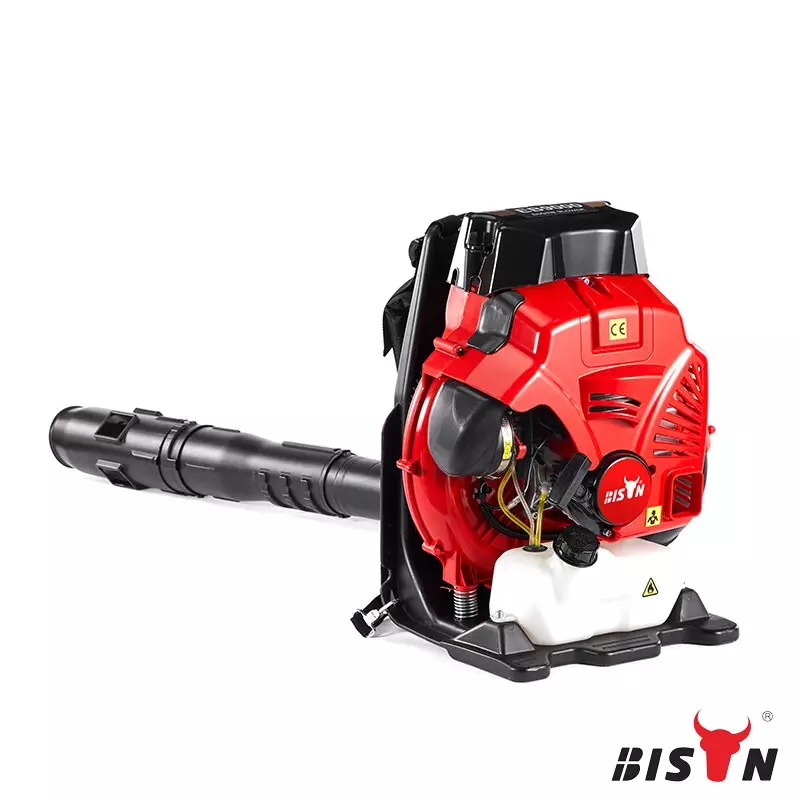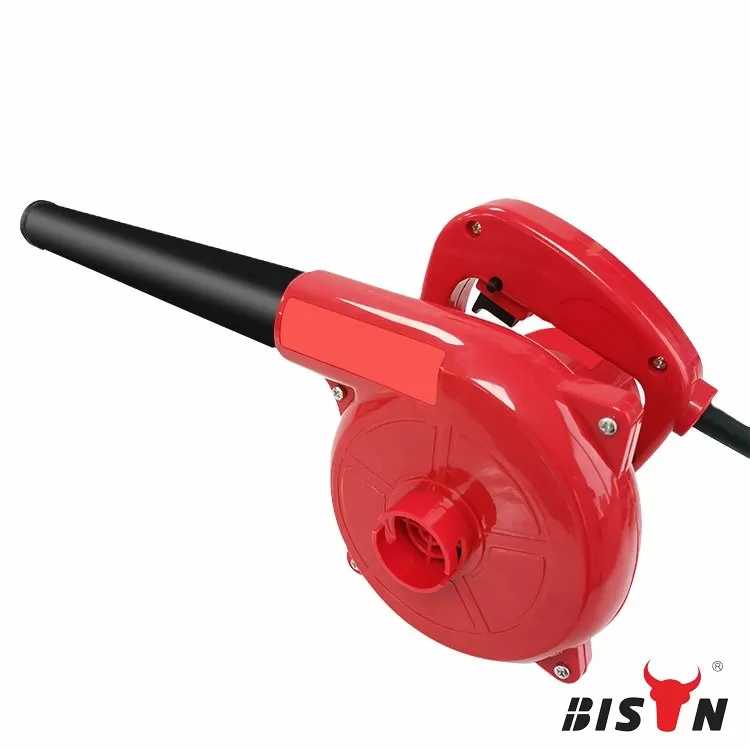Gas vs. electric leaf blower: Choosing the right tool for your needs
2024-02-21
Table of content
A well-maintained yard is not just about aesthetic appeal but also about creating a healthy, inviting space, and a key aspect of yard upkeep is efficiently managing the natural detritus, notably fallen leaves.
The leaf blower market has witnessed a significant expansion over the years. There are predominantly two types of leaf blowers that homeowners and professionals alike are often left to choose between: gasoline and electric. However, the debate between gas and electric leaf blowers is one of the most crucial things to consider when purchasing a new machine.
Which is the best: gas vs. electric leaf blower? BISON has all the information you need about these leaf blowers and an in-depth analysis of both types of blowers, so keep reading.
This will provide insight into making a well-informed decision about whether a gasoline or electric leaf blower is right for your needs.

Gasoline leaf blower
The journey of gasoline leaf blowers began in the 1970s, providing an innovative and efficient solution to the difficult task of clearing acres of leaves. These devices are powered by an internal combustion engine.
Gasoline leaf blowers come in three popular models: handheld, backpack, and push-behind. Each meets different needs. Handheld blowers are lightweight and provide enough power for small sites and medium-sized tasks. Backpack models are often favoured by professionals, fitting comfortably on the back and offering more power for heavy tasks or larger areas. Walk-behind models are at the top end in terms of power and are ideal for large estates or commercial properties.
A key attribute of the range of gasoline leaf blowers is the difference between two-stroke and four-stroke engines. 2-cycle leaf blower produces lower cost, lower weight, and more raw power for the engine size. They are convenient and, therefore, last longer but are noisier, more polluting, and less efficient. 4-cycle leaf blower is heavier, more expensive, and produces less power. However, they are more efficient, less polluting, and less noisy.
Also note that 2-cycle engines require fuel that is a mixture of gas and oil - with 4-cycle engines, oil and gas are added separately, so they don't need to mix themselves.
Gas-powered leaf blowers - advantages
The most significant advantage of gas leaf blowers is their power. The vast yard, with its wet leaves, is where these machines show their capabilities. Additionally, Another big positive when using a gas model is its flexibility. If you have gasoline when it runs out, you can use the gas leaf blower wherever and for as long as you want.
Gas-powered leaf blowers - disadvantages
Unfortunately, gas-powered blowers also have their drawbacks. Their noise levels tend to be very high and can cause disturbance in densely populated communities. They require regular maintenance, including fuel, oil changes and spark plug replacements, resulting in greater ongoing costs over time. In addition, especially two-stroke engines, due to the mixed combustion of oil and gasoline, they will emit a large amount of pollutants that are harmful to the environment and human health. Gasoline is a highly flammable substance and storage can also pose safety risks if not handled properly.
electric leaf blower
Electric leaf blower wave hit the market in the late 1970s, becoming a popular alternative to gasoline leaf blowers due to their stylish, low-maintenance, and environmentally friendly nature. Over the years, these machines have been continuously improved to increase power and efficiency while focusing on user convenience and reducing environmental impact.
The core of an electric leaf blower is to convert electrical energy into powerful airflow. The action of the electric motor initiates this conversion, spinning the impeller (fan) and then pushing the air through the outlet nozzle. The simplicity of this mechanism means an easy-to-use, plug-and-play operation.
electric leaf blowers - advantages
Leaf blowers are run on batteries or corded electric models are available. They are generally quieter and do not cause pollution and are usually light and easy to handle. Electric units also require very little maintenance because you don't have to service the engine, making them ideal for small to medium-sized venues where cord lengths are not limited. Battery-powered leaf blowers don't suffer from the hassle of a cord, meaning you have complete flexibility as to where you can use it. So cordless models are favoured for larger areas where movement is unrestricted.
electric leaf blowers - disadvantages
However, this electric leaf blower has its weaknesses. With a corded blower, your workspace is restricted because it requires you to plug it into a power outlet. You can use extensions, but your range will still be limited. The big problem with using battery power is its limited lifespan. Some models require stopping to recharge after only 15 to 30 minutes of use. You can reduce this by purchasing a spare, which can be expensive. Additionally, although some electric machines can produce good power levels, they cannot compete with the most potent gas-powered blowers.
The difference between electric and gas leaf blowers
Strength
The power source is the first significant difference between electric and gas leaf blowers. This is an essential factor when it comes to finding out how the manufacturer works as well as identifying your demands. In addition, it also affects critical aspects of the leaf blower, including noise level, power output, and maneuverability.
There's no doubt that the gas model can handle large lawns or thick foliage with its powerful, high-capacity exhaust. Electric models, while improved in recent years, can have problems when faced with high-volume tasks, especially those involving moisture or heavy debris.
Weight
Electric leaf blowers are winners in this case. Corded models can weigh up to 4.8 lbs. It is lighter than the cordless model. Also, gas leaf blowers weigh twice as much as electric leaf blowers. Backpack leaf blowers can still be called lightweight models. Because they give users a significant advantage—they put the weight off the user's back. It increases maneuverability.
While electric leaf blowers are considered lightweight, they do limit mobility. In this case, you have to weigh the size of the yard with the volume of leaves that need to be cleaned.
Environmental impact
Electric leaf blowers win hands down due to their eco-friendly features. Zero direct emissions and controlled noise levels make it a sustainable choice, a key consideration, especially if you live in an area with strict noise or environmental regulations. In contrast, gas leaf blowers, especially two-stroke versions, are louder, contribute to air pollution, and may cause disputes in noise-sensitive or densely populated communities. A leaf blower with more than 80 decibels can cause hearing loss. This means that homeowners should help themselves with hearing protectors.
Ease of use
User comfort and ease of operation are major advantages of electric leaf blowers. They are generally lighter, easier to start, and can be run without having to worry about fuel management. Gas leaf blowers will require you to mix expensive fuel, while their electric counterparts will only require replacing the battery. In terms of mobility, battery-powered devices and gasoline models do offer unrestricted movement, while corded devices may limit the range of operations. The need for secure fuel storage (typical of gasoline leaf blowers) is another factor to consider.
Cost
Both types of financial implications need to be considered. Gasoline leaf blowers tend to have higher upfront costs and also require recurring expenses such as fuel, oil, and maintenance parts. Electric blowers may appear cost-effective initially, and ongoing costs will decrease as the maintenance burden is significantly reduced. However, with cordless models, the cost of batteries and occasional battery replacement should be factored into the long-term expense.
Durability and Maintenance
The internal combustion mechanism of a gasoline blower is more complex, may require more frequent maintenance, and may shorten the overall service life. Electric blowers are simpler machines that tend to perform better in terms of durability and require significantly less maintenance, except battery replacement for cordless models.
Which one is best?
Electric leaf blowers are lighter and cheaper, but gas ones are more powerful and can work faster. While some electric leaf blowers are cordless and run on batteries, the majority have a long power cord that can be difficult to handle. Gas blowers emit smoke, a downside that leaf blowers don't have. They also differ in their cost and warranty period.
No "best" leaf maker exists, only the most suitable for the conditions.
Gas power is the way if you need raw power to blast through large jobs and plenty of leaves. Gasoline leaf blower may be over-the-top for home use if you only have a small yard, but it's the go-to tool for commercial-grade use.
Electric blowers are a better option for homeowners who don't have to deal with big leaf piles. A cleaner, more elegant electric tool may be better if you only have a small yard and don't need a giant, noisy, dirty gas monster. You have to decide between corded and cordless devices if you want to go electric.
Your journey to a high-quality leaf blower starts here
Now that we’ve put an end to the heated debate between gasoline leaf blowers and electric leaf blowers, it’s time to turn theory into action. For those looking for industry-leading equipment, look no further. At BISON, our goal is to make this choice not only easier, but more valuable.
As one of China's leading leaf blower manufacturers, we produce both gasoline and electric leaf blowers, each designed to make yard maintenance easier than ever. Our gasoline leaf blowers feature high-performance engines that deliver the powerful gusts needed for heavy-duty tasks that require extraordinary power. On the other side, our electric leaf blowers combine efficiency, user comfort and environmental friendliness to provide a quieter, more sustainable way to keep your yard in pristine condition.
We believe in providing you with diverse options that meet your needs. As a dealer with us, you will have access to a wide range of models suitable for different market segments. Our models incorporate advanced technology to ensure they meet the ever-changing needs of our customers from all walks of life, whether they are homeowners, professional landscapers or residential communities with varying yard maintenance needs.
Please send us your purchase plan immediately. We're ready to welcome you to the BISON family, where quality and innovation combine to clear the way for the perfect yard maintenance solution.

Faqs
Can electric leaf blowers handle wet leaves?
Electric leaf blowers can handle light moisture on leaves but are not ideal for soaking wet conditions. With their higher power, gas blowers are better suited to dealing with wet leaves, making them more versatile in harsh weather.
Are gas leaf blowers suitable for commercial use?
Yes, gas leaf blowers are favored for commercial use due to their exceptional power and portability. They can efficiently clean large areas with heavy leaf coverage, making them a top choice for professional landscaping and commercial applications.
Can I use my leaf blower to remove snow?
Electric leaf blowers can sometimes be adapted for light snow removal, but gas blowers are more efficient due to their higher power. However, for heavy snow, a dedicated snowmaker or shovel is recommended for safety and efficiency.
Which is a noisier, electric or gas leaf blower?
Gas leaf blowers can produce loud noise in 80 to 90 decibels. On the other hand, electric leaf blowers emit between 65 and 70 decibels of noise.




